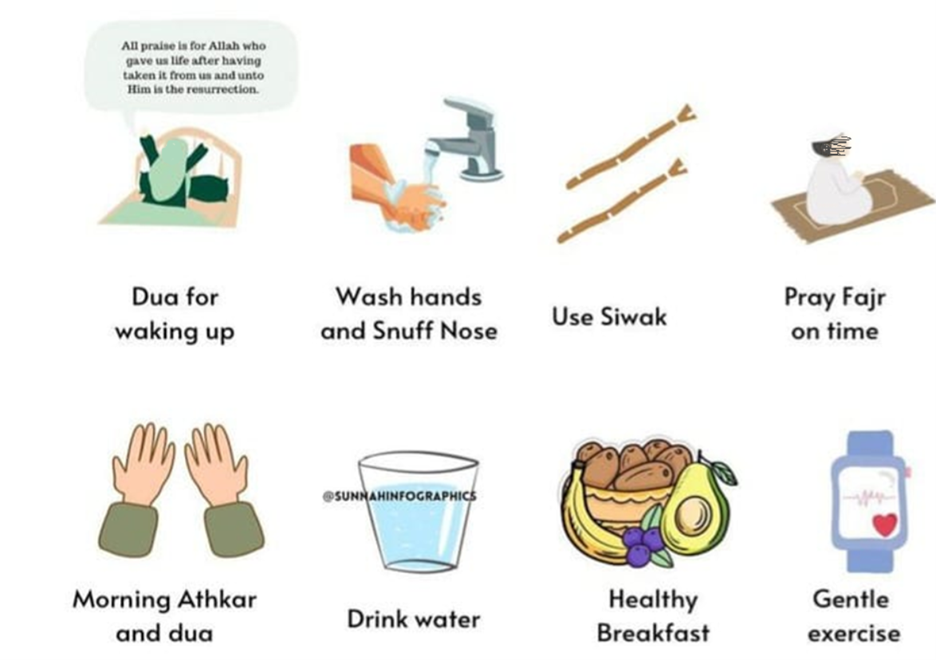Starting the day with a Sunnah-inspired morning routine can set a positive tone for the entire day. By following the practices taught by Prophet Muhammad (peace be upon him), we can align our mornings with spiritual, physical, and mental well-being. This routine not only nourishes our soul but also enhances our overall health and productivity.
1. Begin with the Dua for Waking Up
The moment we open our eyes, the Sunnah encourages us to recite the following dua:
“All praise is for Allah who gave us life after He caused us to die, and to Him is the resurrection.”
(Sahih Bukhari 6312)
This dua reminds us to express gratitude for being given another day to live. From a psychological perspective, starting the day with gratitude fosters a positive mindset, helping us feel more content and optimistic throughout the day.
2. Wash Hands and Snuff Nose
The Prophet (peace be upon him) advised us to wash our hands and snuff water into our nose upon waking:
“When any one of you wakes up from sleep, let him wash his hands before putting them into the vessel of water three times, for none of you knows where his hands were while he slept.”
(Sahih Bukhari 162)
Washing our hands and snuffing water into our nose not only cleanses us physically but also refreshes the mind. This simple act of cleanliness helps us start the day with a sense of purity and readiness.
3. Use Siwaak (Toothstick)
The use of siwaak is a highly recommended Sunnah for oral hygiene. The Prophet (peace be upon him) said:
“Were it not for the fact that I feared it would be too difficult for my Ummah, I would have commanded them to use the siwaak before every prayer.”
(Sahih Muslim 252)
Using the siwaak or a toothbrush upon waking not only cleans our teeth but also revitalizes us, leaving us feeling fresh and alert. Psychologically, cleanliness boosts our self-confidence and mood, making us more prepared to face the day.
4. Pray Fajr on Time
Performing the Fajr prayer on time is crucial in starting the day with the right intention and connection with Allah. The Quran emphasizes the importance of Fajr:
“Indeed, the recitation at dawn is ever witnessed.”
(Al Isra:78)
Praying Fajr on time provides spiritual strength, setting a positive tone for the day. From a psychological viewpoint, this early morning discipline fosters a sense of accomplishment and peace, as we fulfill our duty to Allah.
5. Morning Athkar and Dua
Engaging in morning athkar (remembrances) and duas helps us stay connected with Allah throughout the day. The Prophet (peace be upon him) would regularly recite morning remembrances, seeking protection and blessings:
“O Allah, I ask You for knowledge that is of benefit, a good provision, and deeds that will be accepted.”
(Sunan Ibn Majah 925)
These athkar serve as a shield against anxiety and negativity, promoting a calm and focused mindset. Psychologically, these affirmations reinforce positive thinking and mindfulness, helping us navigate the challenges of the day with ease.
6. Drink Water
The Sunnah encourages us to drink water early in the morning. The Prophet (peace be upon him) recommended drinking water in a gentle manner:
“Do not drink water in one gulp, like a camel, but drink it in two or three sips.”
(Tirmidhi 1885)
Drinking water upon waking up kick-starts our metabolism and hydrates our body after hours of rest. From a psychological perspective, staying hydrated improves concentration, energy levels, and mood.
7. Have a Healthy Breakfast
A nutritious breakfast is essential for fueling our body and mind. The Prophet (peace be upon him) emphasized moderation in eating:
“The son of Adam does not fill any vessel worse than his stomach. It is sufficient for the son of Adam to eat a few mouthfuls, to keep him going. If he must do that (fill his stomach), then let him fill one-third with food, one-third with drink, and one-third with air.”
(Sunan Ibn Majah 3349)
A balanced breakfast that includes whole grains, fruits, and proteins provides the energy needed for the day. Psychologically, eating well helps regulate blood sugar levels, reducing stress and enhancing cognitive function.
8. Gentle Exercises
Incorporating gentle exercises, such as stretching or walking, into the morning routine aligns with the Sunnah of staying active. The Prophet (peace be upon him) was known for maintaining physical fitness, often engaging in walking and other activities. Regular exercise promotes physical health and releases endorphins, which are natural mood enhancers. From a psychological standpoint, morning exercise improves mental clarity, reduces stress, and increases overall well-being.
A Sunnah-inspired morning routine is a holistic approach to begin the day with spiritual, physical, and mental health in mind. By integrating these practices, we not only follow the teachings of the Prophet Muhammad (peace be upon him) but also nurture our well-being. This routine promotes a sense of balance, mindfulness, and gratitude, allowing us to start each day with purpose and positivity.





